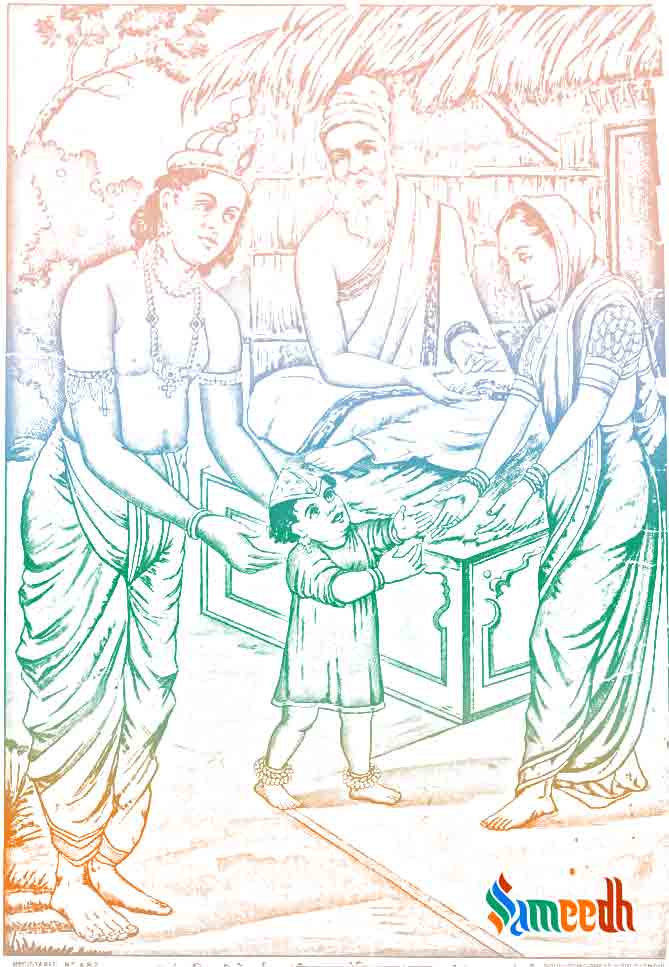Significance, life journey and teachings of lord Krishna’s guru

Image Source: Ravi Varma Press
Rishi or sage Sandipani was the teacher or guru of Krishna, an avatar of Vishnu, preserver of life and his brother Balram. The name Sandipani translates to sage of gods. He is a saint from the city of Ujjain in the Indian state of Madhya Pradesh. Ujjain was formerly known as Avantipura. That is where his ashram or institution was also located. Years later, an inscribed tablet of stone with numbers from 1 to 100 was written on it. It is believed that Rishi Sandipani himself carved these on the tablet while teaching.
Sandipani as a student
Sandipani was not a bright student himself, he was not sharp or brilliant per say. But sage Sandipani was truly a devotional being who would do only what is asked of him, he was one to follow instructions.
During his early days, while at school, his guru had asked him to throw a baby in oil. Without a second’s pause or hesitation, Sandpani did what was told to him. Immediately, other sages rushed to rescue the baby and later started hitting and abusing Sandipani for doing so. But Sandipani did not say anything or defend himself. His only stance was that he did what was told to him by his guru. Similarly, in another incident, Sandipani’s guru had asked him to set fire to all the huts or shelters in the educational institution while others were away. And again, Sandipani obliged without any questions. He was then beaten up again by the saints and other disciples. His love and determination towards his guru was unmoved throughout the span of their equation.
When the guru was breathing his last, all his students went to pay their respects. The guru handed each of the students some of the other of his accessories as a token of blessing. But when Sandipani came to bow down against him, his guru clearly mentioned how there was nothing more left to give away to his students. This did not trouble Sandipani to the least. The great sage only wanted his guru’s blessings and no other materialistic thing. Impressed by him thoroughly, his guru not only blessed him but promised him that once Sandipani returns home, the lord himself will seek his guidance and mentorship in the form of a student. Which is how Krishna came to Sandipani as a learner.
Guru Sandipani
Lord Krishna along with his brother and friend Sudama were students of rishi Sandipani. The mighty lord Krishna had learnt valuable life lessons, skills, strategies and gained immense knowledge from his guru. After all these years of learning, Krishna asked what his guru wanted as a dakshina, payment or fees. Sandipani expressed his gratitude by saying how simply having Krishna as his student was a privilege for him. Upon insisting and persuasion, Sandipani gave in and proposed a form of receiving dakshina. Sandipani had lost his own son in the ocean at Prabhas long ago. For his fees, he asked Krishna and Balram to try and retrieve his son from the depths of the ocean. The brothers obliged willingly and discovered how the son had been taken by Shankhasur, a demon, who lived in a conch shell. The brothers bravely took the shell to Yama, god of death, who blew into the shell and brought forth Sandipani’s son. The shell is then kept by Krishna after naming it Panchajanya.
In his honour, lies the institution of ashram called Sandipani Vidyaniketan near Porbandar in the state of Gujarat. This educational organisation is visited by many students and now the place covers an area of 85 acres. What started as a small scale place or education is now an institution imparting knowledge to countless kids, rightly symbolising the saint under whose name it functions.